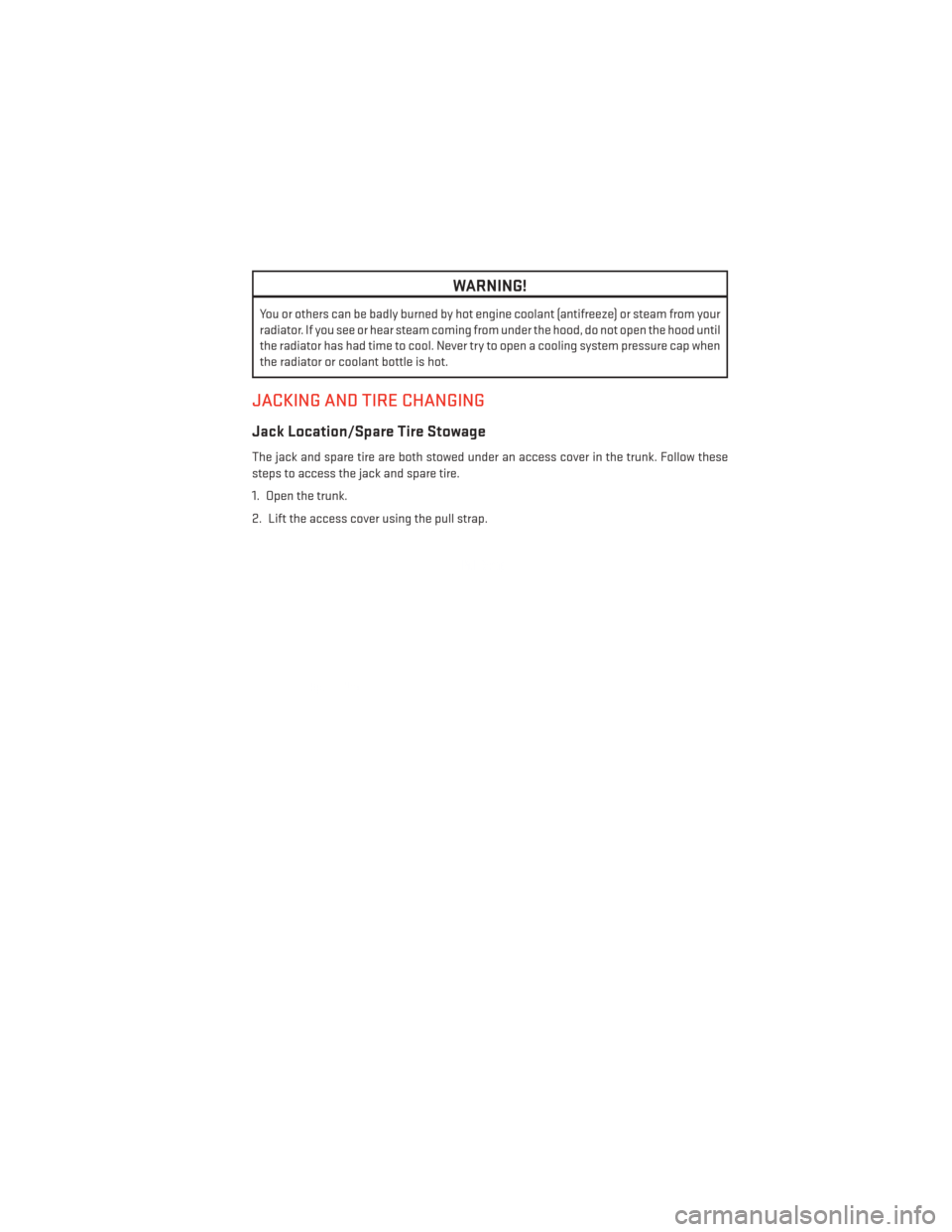WARNING!
You or others can be badly burned by hot engine coolant (antifreeze) or steam from your
radiator. If you see or hear steam coming from under the hood, do not open the hood until
the radiator has had time to cool. Never try to open a cooling system pressure cap when
the radiator or coolant bottle is hot.
JACKING AND TIRE CHANGING
Jack Location/Spare Tire Stowage
The jack and spare tire are both stowed under an access cover in the trunk. Follow these
steps to access the jack and spare tire.
1. Open the trunk.
2. Lift the access cover using the pull strap.
WHAT TO DO IN EMERGENCIES
89
ComponentFluid, Lubricant, or Genuine
Part Capacities
Spark Plugs 2.0L Engine We recommend you use MOPAR® Spark Plugs
(Gap 0.043 in [1.1 mm]) —
Spark Plugs 2.4L Engine We recommend you use MOPAR® Spark Plugs
(Gap 0.047 in [1.2 mm]) —
Automatic Transmission –
1.4L Turbo Engine We recommend you use
MOPAR® C635 DDCT/MTX
Transmission Fluid. —
Automatic Transmission –
2.0L, 2.4L Engine We recommend you use
SK Energy ATF SP-4 Trans-
mission Fluid. —
Manual Transmission We recommend you use MOPAR® C635 DDCT/MTX
Transmission Fluid. —
Brake Master Cylinder We recommend you use MOPAR® DOT 3 SAE J1703.
If DOT 3 is not available, then
DOT 4 is acceptable. Only use
recommended brake fluids. —
CAUTION!
• Mixing of engine coolant (antifreeze) other than specified Organic Additive Technol-
ogy (OAT) engine coolant (antifreeze), may result in engine damage and may de-
crease corrosion protection. Organic Additive Technology (OAT) engine coolant is
different and should not be mixed with Hybrid Organic Additive Technology (HOAT)
engine coolant (antifreeze) or any “globally compatible” coolant (antifreeze). If a
non-OAT engine coolant (antifreeze) is introduced into the cooling system in an
emergency, the cooling system will need to be drained, flushed, and refilled with
fresh OAT coolant (conforming to MS-12106), by an authorized dealer as soon as
possible.
• Do not use water alone or alcohol-based engine coolant (antifreeze) products. Do not
use additional rust inhibitors or antirust products, as they may not be compatible
with the radiator engine coolant and may plug the radiator.
• This vehicle has not been designed for use with propylene glycol-based engine
coolant (antifreeze). Use of propylene glycol-based engine coolant (antifreeze) is not
recommended.
MAINTAINING YOUR VEHICLE
112

![DODGE DART 2014 PF / 1.G User Guide ComponentFluid, Lubricant, or Genuine
Part Capacities
Spark Plugs 2.0L Engine We recommend you use MOPAR® Spark Plugs
(Gap 0.043 in [1.1 mm]) —
Spark Plugs 2.4L Engine We recommend you use MOPAR® DODGE DART 2014 PF / 1.G User Guide ComponentFluid, Lubricant, or Genuine
Part Capacities
Spark Plugs 2.0L Engine We recommend you use MOPAR® Spark Plugs
(Gap 0.043 in [1.1 mm]) —
Spark Plugs 2.4L Engine We recommend you use MOPAR®](/img/12/5599/w960_5599-113.png)